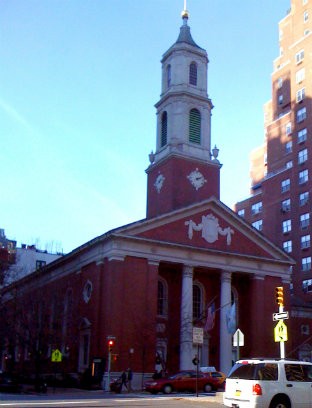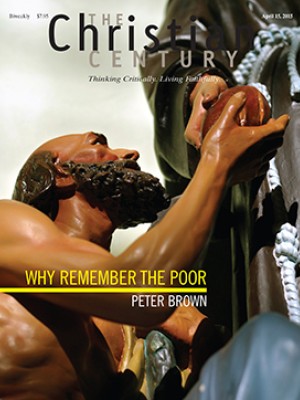A pastor’s place: All ministry is local
If you’re a pastor and cannot come to love the congregation you serve, cannot love the culture and community in which that congregation is set, you must leave. Ministers cannot effectively serve people they don’t love. And if a pastor is at odds with the culture of the larger community, members of the congregation will soon recognize it and view their minister as he views himself—as an outsider.
I once attended a church conference on the high plains of north-central Kansas. The landscape was stark—rolling prairie, waving grasslands, flint hills, and few trees, often no trees. I commented on the strange loveliness of it to an older woman over coffee one morning. She said, “Not everyone thinks it beautiful. I was on the pastor nominating committee for our church a while back. We had a candidate we liked from New Jersey. I drove to the airport to pick him up. As we headed west into the high plains and the trees got fewer and the towns farther apart, he got the ‘deer-in-the-headlights’ look. He was talking less and less. We got to the church for the interview and right in the middle of it, out of nowhere, he stood up and said, ‘God would never call me to a place with so few trees. I want to go home now.’” Better now than later.
Read our latest issue or browse back issues.
Conversely, when members of a congregation recognize—as they invariably will—that their pastor loves them and loves their particular place, they will almost always come to welcome his or her leadership or “authority.” William Sloane Coffin, after his rambunctious Yale days and during his provocative New York City days, said that he had always been amazed at how much he could “get away with” (he meant controversial sermons and programs) as long as his people knew he loved them and respected their opinions.
The legendary Tip O’Neill opined, “All politics is local.” All ministry is local, too, perhaps even more so than politics. There is no such thing as “ministry in general”; it’s always ministry in a specific place, among specific people, and in a specific culture. Every pastor is in loco pastoris.
In this way ministry is parallel to the specificity of the incarnation. By definition, the incarnation had to be in one person whose physical body was short or tall, dark or fair, handsome or not. Incarnation was in Jesus of Nazareth, not Jesus of Everywhere. Jesus was a Galilean Jew and not, say, an Alexandrian Jew. He lived his incarnate life in one time and no other.
God’s choice of a unique person implies that God loves the specificities in which God embodies the Divine. It doesn’t mean that God loves Jesus’ body, his time, his culture, or his geography more than other human bodies, other times, or other cultures. Rather, it means that all are greatly loved, but loved in and for their uniqueness.
Ministry too is incarnationally specific. Ministry is rural, urban, or small-town. Congregations are rich or poor, growing or shrinking, happy or dour. Buildings are lovely or leaky, too big or too small. Cultural contexts are sophisticated or homey, rural, small-town, big city, Bach or country western. God loves each congregation and each context in and for its particularity. A pastor is called to see his or her place and people with God’s “lover’s eye,” and to love them for their particularity.
Two vocational metaphors describe the relationship between pastor and congregation. Each has some value but can be problematic as well. First, it is commonplace to speak of pastors as “professionals.” The word suggests education and specialization akin to that of, say, a physician or an attorney. “Professional” may also imply something about social position and be a measure of recognition that many clergy long for in our post-Constantinian disestablishment. To be a professional may also imply that one does one’s work well—“professionally.”
These nuances may be helpful, but another implication of “professional” is not. A professional is a provider of services who is generally called to keep a “professional distance.” The implication is that the pastor-as-professional is educated to know things that others do not fully understand (biblical Greek or the mysteries of higher criticism) or trained in skills (pastoral counseling or group dynamics) that he or she offers to the congregation. The assumption is that the people in the congregation are less educated theologically and untrained in the skills of “professional ministry.” Understood this way, the image of pastor-as-professional can create a distance between laity and clergy that’s not so much about how close you are to God as how close you are to knowing it all.
The term may make a fit point about education and competence, but its implications about social status are mostly self-aggrandizing, and the implication of special ministry skills and theological expertise tends to turn ministry into technique—a bag of tricks and arcane seminary gnosis. This understanding of pastor can distance “pastor service providers” from the congregations to which they offer their sundry professional services.
A second metaphor for pastoral ministry that’s sometimes appropriate but also problematic is “pastor as prophet.” The church is clearly called to a prophetic ministry. But the role belongs to the church as a whole—to congregations and judicatories as well as national and global ecclesiastical bodies. It involves individual pastors insofar as they lead their congregations or denominations in finding their common prophetic voice.
The prophetic metaphor for pastoral ministry becomes problematic when the model of prophecy in the Old Testament—a prophet speaking for God to fallen Israel and calling the people back to covenant faithfulness—is recast so that the pastor is the prophet speaking for God and calling the fallen church back to faithfulness.
The perils here are potentially deadly to the relationship between pastor and congregation. Rather than perceiving themselves to be called to a prophetic role against the congregation, pastors need to understand themselves as called to a prophetic role with the congregation against injustice and unrighteousness. Of course, injustice and unrighteousness are not merely “out there” in the world, but also in and among the people of God, the pastor included.
In practice, this is a fine line for pastors and preachers to walk. Loading sermons with first-person plural pronouns—we’s and us’s when speaking of some manifestation of unrighteousness—won’t suffice. Pastors are called to identify with their congregations and communities and to acknowledge both a complicity in injustice and a call to resist that complicity. For instance, whenever a Sunday Gospel text offers up Pharisees and scribes, my hermeneutical mantra is to cast them in the sermon as “us,” never as “you the congregation” or “those people,” but “all of us,” or at least “some part of all of us”—the minister included.
Pastors who’ve grown angry with the world’s injustices and inequities, angry with ministry, and angry with their congregations can too easily slip into scolding their congregations, usually subtly, often with aggressiveness clothed in clerical passivity. They justify it by donning the prophet’s mantle, which allows them to imagine that their behavior is courageous.
A congregation will not be led by badgering or scolding. If the members of a congregation aren’t responding to a call that God may have set before them, it takes the pastor time, love, and patience to grow with them toward a shared response.
A third metaphor, the metaphor of marriage, is sometimes used to speak of the relationship between pastor and congregation. It doesn’t work. What happens when a pastor leaves? Does the marriage become a divorce? I’m more drawn to the metaphor of lover and beloved.
In my experience, people in love seem to see the one they love “hopefully.” Lovers are not so much blind as they are empowered to see their beloved with hope. Although people in love recognize the flaws and weaknesses of their beloved ones, they somehow also see them as lovable and full of promise.
This, of course, is precisely the way God sees you and me—simul justus et peccator, “saint and sinner at the same time.” And this is how a pastor ought to love those in his or her congregation. The pastor recognizes all of their flaws and weaknesses but sees even those imperfections as full of promise.
Speaking at a new members class, a pastoral associate of mine described the mission commitment of the congregation we served. He waxed rhapsodic about the depth and breadth of the congregation’s efforts. After the class, another church member pulled him aside and said kindly, “Weren’t you laying it on awfully thick about our mission efforts?” The minister responded, “I always prefer to see my congregation eschatologically.” He chose to see our congregation hopefully, through a lover’s eye, as who they might become.
In premarital counseling sessions and wedding meditations, I remind brides and grooms that love is a two-sided coin. On one side, I tell them, is how you feel—your passion for each other, that visceral set of emotions that draws you to one another. But on the other side of the coin is what you choose. This side of the coin is an act of will—commitment, covenant, and vow. Feelings have sunny days, and they have overcast days, I tell them. The commitment you promise each other will pull you through the cloudy days. Jesus commands just this kind of chosen love. Feelings can hardly be ordered up, but choices can be commanded, and we can choose to obey them. So a pastor can—and must—choose to love his or her congregation as well as the place in which he or she has been called to serve.
When my wife and I moved to New York City 12 years ago, we were jolted by the wealth of the community we were called to serve. There are private schools, men’s and women’s clubs and dinner parties where reference to informal dress means coat and tie instead of a tuxedo. And there are events at which a tuxedo is expected.
I asked a long-term and successful former associate pastor of the congregation for advice. She offered me strange counsel. “Have fun with it,” she said. “Take delight in it as it is. Don’t let it swallow you, but find joy in it.”
So I bought a tux on sale at Macy’s. I see my congregation and my city, with all their glaring and unique flaws, as lovable and full of promise. I love the church, the place, and the people simul justus et peccator. I have no other choice.







